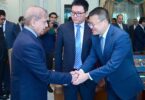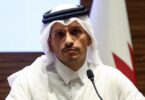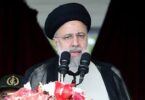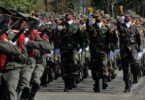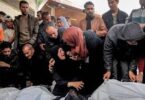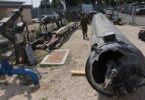F.P. Report
WASHINGTON: Secretary Antony J. Blinken has said that Foreign Minister Lavrov and I finished our meeting a short while ago, and I first want to begin by thanking Switzerland for hosting us, for its traditional hospitality, which is very much appreciated.
This he said while addressing to a press conference, I came to Geneva following up on last week’s discussions at the U.S.-Russia Strategic Stability Dialogue, the NATO-Russia Council, and the OSCE on the crisis in Ukraine and broader European security issues. Our objective was to determine whether Russia is prepared to take the diplomatic path and other necessary steps to de-escalate the situation in Ukraine and, ultimately, to resolve our differences through diplomacy and through dialogue.
The discussion today with Minister Lavrov was frank and substantive. I conveyed the position of the United States and our European allies and partners that we stand firmly with Ukraine in support of its sovereignty and territorial integrity. We’ve been clear: If any Russian military forces move across Ukraine’s border, that’s a renewed invasion. It will be met with swift, severe, and a united response from the United States and our partners and allies.
We also know from experience that Russia has an extensive playbook of aggression short of military action, including cyber attacks, paramilitary tactics, and other means of advancing their interests aggressively without overtly using military action. Those types of Russian aggression will also be met with a decisive, calibrated, and again, united response.
That’s the clear message coming out of my meetings on Wednesday in Ukraine with President Zelenskyy, Foreign Minister Kuleba; yesterday in Germany with my counterparts from Germany, the UK, France, and the European Union; and with German Chancellor Scholz. We’re united in our commitment to finding a way forward through diplomacy and dialogue, but equally in our resolve to impose massive consequences should Russia choose the path of confrontation and conflict.
I expressed again to Minister Lavrov that on the security concerns that Russia has raised in recent weeks, the United States and our European allies and partners are prepared to pursue possible means of addressing them in a spirit of reciprocity, which means, simply put, that Russia must also address our concerns. There are several steps that we can take – all of us, Russia included – to increase transparency, to reduce risks, to advance arms control, to build trust.
I conveyed directly to Minister Lavrov our specific concerns for Russia’s actions that challenge or undermine peace and security not only in Ukraine but throughout Europe and, indeed, in the world. I also laid out several ideas to reduce tensions and increase security which we’ve developed in consultation with our partners and allies and where we believe we can find common ground, again, based on the principle of reciprocity.
This was not a negotiation but a candid exchange of concerns and ideas. I made clear to Minister Lavrov that there are certain issues and fundamental principles that the United States and our partners and allies are committed to defend. That includes those that would impede the sovereign right of the Ukrainian people to write their own future. There is no trade space there – none.
Foreign Minister Lavrov and I also talked about the way forward. Let me say as well that he heard from us and from me that what is for us an inviolable rule: nothing about Ukraine without Ukraine, nothing about NATO without NATO, nothing about Europe without Europe. Based on our discussion, I believe we can carry forward this work of developing understanding agreements together that ensure our mutual security, but that’s contingent on Russia stopping its aggression toward Ukraine.
So that’s the choice that Russia faces now. It can choose the path of diplomacy that can lead to peace and security or the path that will lead only to conflict, severe consequences, and international condemnation. The United States and our allies and partners in Europe stand ready to meet Russia on either path, and we will continue to stand with Ukraine.
I believe that Foreign Minister Lavrov now has a better understanding of our position and vice versa. Today’s discussion was useful in that sense, and that’s precisely why we met.
So I’ll return to Washington this afternoon to consult with President Biden and our entire national security team, as well as members of Congress, and critically, allies and partners in the days ahead. Based on the discussions today, Foreign Minister Lavrov and I agreed that it’s important for the diplomatic process to continue. I told him that following the consultations that we’ll have in the coming days with allies and partners, we anticipate that we will be able to share with Russia our concerns and ideas in more detail and in writing next week. And we agreed to further discussions after that. We agreed as well that further diplomatic discussions would be the preferable way forward, but again, it is really up to Russia to decide which path it will pursue.
I should mention as well that the foreign minister and I had an opportunity to discuss Iran, an example of how the United States and Russia can work together on security issues of shared concern. The talks with Iran about a mutual return to compliance with the JCPOA have reached a decisive moment. If a deal is not reached in the next few weeks, Iran’s ongoing nuclear advances will make it impossible to return to the JCPOA.
But right now, there’s still a window, a brief one, to bring those talks to a successful conclusion and address the remaining concerns of all sides. We didn’t expect any major breakthroughs to happen today, but I believe we are now on a clearer path in terms of understanding each other’s concerns, each other’s positions. Let’s see what the next the next days bring.
While answering to a question, Blinken said that last question is probably best addressed to President Putin because, in a sense, only he really knows. And I’ll come back to that in a minute. But again, as I was saying earlier, I think that as we’ve looked at what Russia has put forward, as we’ve listened to what they’ve said, as we’ve consulted intensely among allies and partners, as we’ve looked at our own deep security concerns about actions that Russia takes – not only with regard to Ukraine, but in other places and by other means in Europe and beyond – I think it is fair to say that there are areas where we believe we can pursue dialogue and diplomacy to see if we can find ways to address mutual security concerns on a reciprocal basis that would enhance security for everyone – for us, for our European allies and partners, and for Russia.
And again, as I suggested earlier, transparency, confidence-building measures, military exercises, arms control agreements – these are all things that we’ve actually done in the past and that, if addressed seriously, can I believe reduce tensions and address some of the some of the concerns. But again, that remains to be seen whether we can do that in a meaningful way. And there again it depends, I think, on what Russia actually wants. That is the right question.
And here’s what is striking to me, and I shared this with Foreign Minister Lavrov today. I asked him, from Russia’s perspective, to really try to explain to me, to us how it is they see the actions they’ve taken as advancing their stated security interests and their broader strategic interests. Because as I said to Minister Lavrov, so many of the things that you’ve done in recent years have precipitated virtually everything you say you want to prevent.
Before Russia invaded Ukraine in 2014, seizing Crimea, going into the Donbas, Russia’s favorability ratings in Ukraine were 70 percent. Now they’re 25 or 30 percent. Before 2014, before they went and seized Crimea and went into the Donbas, support in Ukraine for joining NATO was 25 or 30 percent. Now it’s 60 percent. Before 2014, we had been continuing on the path of continuing to reduce while at the same time strengthening our forces in Europe since the end of the Cold War. Well, what happened after 2014 is NATO felt the obligation, because of Russian aggression, to reinforce its eastern flank. And since 2014, our efforts over many years to convince allies and partners to increase defense spending, well, that succeeded, but I have to say, as much because of Russia and the actions it’s taken as because of anything we’ve done.
So based on Russia’s stated strategic interests and concerns, how has that – how have their actions advanced those concerns? On the contrary, it’s gone in the opposite direction from what Russia purports to want. And now, if Russia renews its aggression against Ukraine, the outcome will be to simply reinforce the very things, the very trends that Russia expresses concern about. So I hope that that’s something that Mr. Lavrov reflects on and that President Putin might reflect on as they think about the days and weeks ahead.

